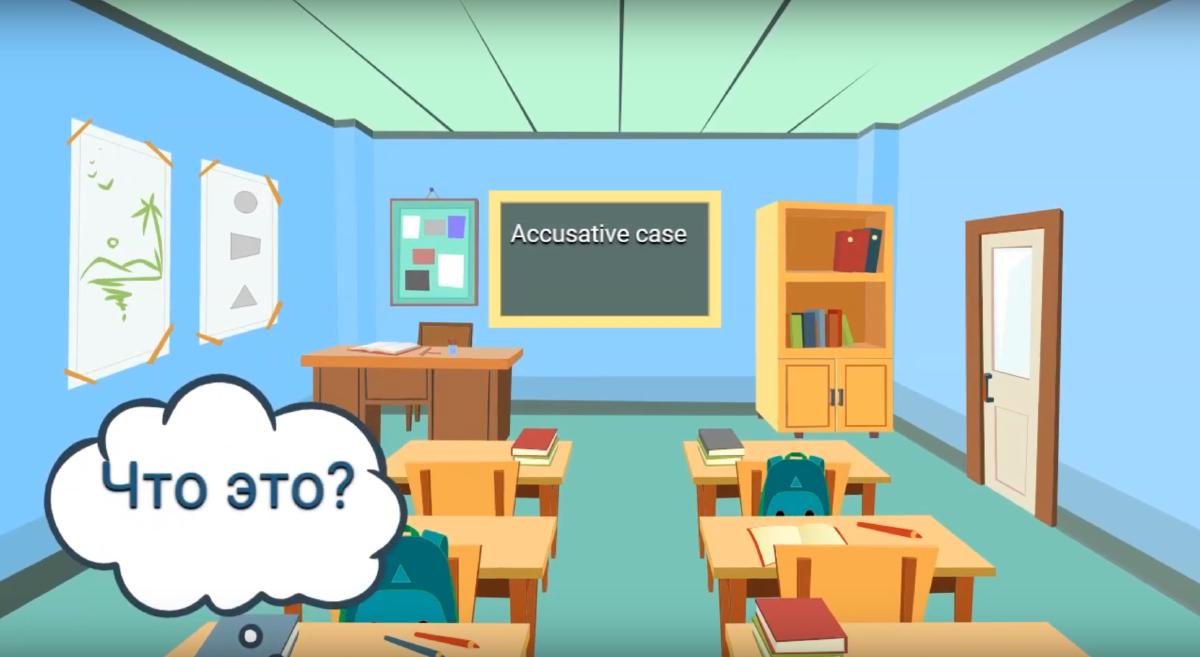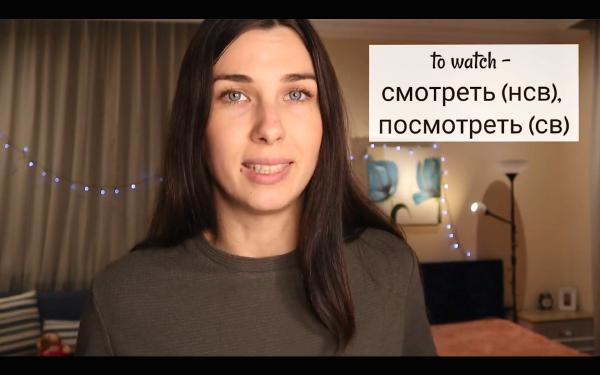Fourth Case: Accusative
The joker in a card game, the knight in chess: if you’re looking for something as quirky among the six cases, you’ll quickly land on the fourth. Rules for the accusative or винительный падеж are simple, yet (or perhaps because of that) it can easily catch you off guard.
Usage
Direct Object
The fourth case, or accusative, is used when something happens to someone or something. In the sentence, it acts as the direct object. For example: “I buy a magazine, I read the newspaper.” Magazine and newspaper are direct objects (and take the accusative case) because they are being bought or read. You can also say: the subject (I) performs an action.
The verb in such sentences (buy, read) is called transitive.
- Transitive and Intransitive Verbs (Grammarly)
Direction and Distance
The accusative case is also used to express direction, especially towards a destination, and for distances in space or time.
To Russia (Россия): в Россию.
To work (работа): на работу.
In a week (неделя): через неделю.
He looked through me: он смотрел сквозь меня.
Prepositions
The accusative logically follows prepositions that indicate direction or distance. Such as в and на (towards), сквозь (through), and через (over). В and на can also trigger the prepositional case when they mean “in” or “on.” Use the accusative when answering куда (where to?), and also in common constructions like из … в (from … to) and с … на (from … to).
With по, either the accusative or the dative case may follow. With за (for) and под (under), both the accusative and instrumental cases are possible. За with the accusative is frequent, even in sentences where you don’t immediately detect direction or distance.
I (f.) am happy for you: я рада за вас.
Pay for the rent (аренда): платить за аренду.
Fight for the country (страна): бороться за страну.
Thanks for the vodka: спасибо за водку.
More in Russian Preposition ЗА / Accusative case (Live Russian, 2018, 9 m).
Also, see from the same channel:
- Russian cases through examples / The preposition ЗА (2017, 3 m)
- Russian cases through examples / Direct object (2017, 6 m)
- Russian cases through examples / Direction of motion (2017, 5 m)
- Russian cases through examples / Masculine animate words (Live Russian, 2017, 2 m)
Also, see:
- Accusative case Russian/Предлоги В, НА, ЗА, ПОД, ЧЕРЕЗ и т. (Marina, 2017, 21 m)
- Russian Grammar: Prepositions with Accusative Case (OSUEcampusFL, 2013, 15 m)
- Prepositions Governing the Accusative Case (Alpha Dictionary)
Days of the Week
You also use the accusative case to say “on Monday,” “on Tuesday,” “on Wednesday,” etc., with the preposition в (and во for Tuesday). The case is only visible with the days ending in а (e.g., в среду, в пятницу, в субботу).
The accusative is also used without a preposition. For example, “every Saturday”: каждую субботу.
See
Russian calendar words.
Verbs
The accusative follows common verbs like читать (read), помнить (remember), строить (build), покупать (buy), знать (know), готовить (cook), слушать (listen), изучать (study), and любить (love). All of these are transitive verbs, and there are many such verbs. The accusative (or dative) is also used with verbs of motion, a topic for later.
Declensions
Masculine and Neuter
The easiest part of the accusative case is that neuter words remain unchanged, and most masculine words do too. For example, журнал (magazine) – whether you buy it, read it, or burn it, the word stays the same because it’s masculine. In other words, журнал stays like it is in the nominative case (nominative).
Feminine
Feminine words do change, but the rule is simple. An ending а becomes у, and я becomes ю. It’s easy to remember because it rhymes. The same goes for adjectives. It’s even easier if the word ends in a soft sign (ь) because then nothing changes.
See this Russian Cases – Nouns in the Accusative (Russian grammar, 2013, 4 m).
Before that, from the same channel, watch the
Introduction to the Accusative (2013, 2 m), which also explains why word order in Russian is flexible. Борис любит Ольгу (Boris loves Olga) is the same as Ольгу любит Борис. The accusative has turned Ольга into Ольгу, indicating she is loved, and the rest doesn’t matter anymore.
Adjectives are explained in the Introduction to the Accusative: Adjectives (2020, 2 m).
Alive or Not
Masculine words do change when they refer to a living being. If it’s animate (одушевлённое or animate), it follows the rules of the genitive case. So, don’t just look at the letters. “I see a journalist” (журналист): я вижу журналиста.
The second and fourth cases also share the same personal pronouns. Tamara has a song about them (2019).
What is considered living (or non-living) is a story in itself. See Wanted Dead Or Alive: Noun Animacy in Russian (Russian Language Blog, 2015) and Кто? Что? Одушевленное и неодушевленное (Шишкина школа, 2014, 7 m).
Training
Get straight into practice with Accusative Case with Direct Object | Practice 1 (Amazing Russian, 2018, 9 m). There’s also a Practice 2 (2020, 5 m).
Before that, from the same channel, check out Accusative Case: Introduction (2018, 11 m), which also briefly touches on the freedom of word order given by the accusative case. It also covers some grammar and gives eight transitive verbs that are followed by the accusative: читать, писать, знать, понимать, изучать, слушать, смотреть, любить (read, write, know, understand, study, listen, watch, love).
Plural
In the plural, all неодушевлённое (inanimate) nouns follow the rules for the nominative case. Masculine, neuter, and feminine. If they are animate, they all follow the genitive, which can get pretty complicated.
In Russian Cases – Accusative Plural (Russian grammar, 2013, 2 m), examples include Я знаю этих студентов and Я знаю этих девушек.
More declensions can be found in Винительный падеж. Существительные. Часть 1 (О русском по-русски, 2019, 17 m). Also, see part 2 and Винительный падеж| Прилагательные (2020, 19 m). Also, Винительный падеж. Окончания (Russian Language for Life and Work, 2018, 9 m).
3 Summaries
Victoria Arysheva keeps a good pace. Perhaps a bit much for now, but worth revisiting. +1 for poetic example sentences like солнце зашло за тучу (the sun disappeared behind clouds) and сквозь туман и тучи самолёт летит вперёд (through fog and clouds, the plane flies on).
From more recent (2020) explanations, there’s Винительный Падеж by русский с носителем…
And a brief two-minute overview from Yana Svet (2020).
More
- The Russian Accusative Case (Russian Through Propaganda, 2020, 66 m)
- Accusative case in Russian (Russian for everyone, 2020, 12 m)
- Accusative case Live (Real Russian Club, 2020, 61 m), see also Lesson 19
- Винительный падеж (что? кого?) (Лаборатория ИМО, 2020, 7 m)
- Как определить винительный падеж? (Начальная школа, 2019, 7 m)
- Learn Russian: Accusative Case (LRW Alfia, 2019, 9 m), see also part 2
- My accusative case practice method in Russian (American Studying Russian, 2018,18 m)
- Винительный падеж имени существительного (ИНФОУРОК, 2017, 7 m)
- Russian grammar lessons: Accusative Case (Anna Cher, 2017, 10 m), see also part 2
- Accusative Case In Practice | Russian Cases (Be Fluent in Russian, 2017, 3 m)
- Russian cases – Accusative 1 (R for Russian, 2016, 42 m), see also part 2
- Accusative case. Russian grammar (Ru-Land Club, 2015, 7 m)
- Revision – Accusative case (Key2Russian, 2015, 13 m)
- Accusative case in Russian – how to use it (annutaklein, 2012, 5 m)
- Russian Cases – Accusative vs Nominative (Russian Plus, 2010, 6 m), see also part 2
See/read:
- Introduction to the accusative case (Russian for Free)
- Accusative case in Russian language (Russian Lessons Online)
- Complete Russian Accusative Case Guide (Learn the Russian Language)
- Accusative Case in Russian (Pa Russki)
- The Accusative Case in Russian: Usage and Examples (ThoughtCo.)
- The Accusative Case (Master Russian)
More








